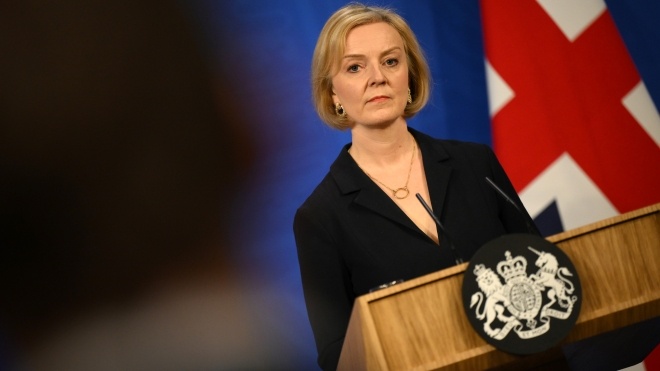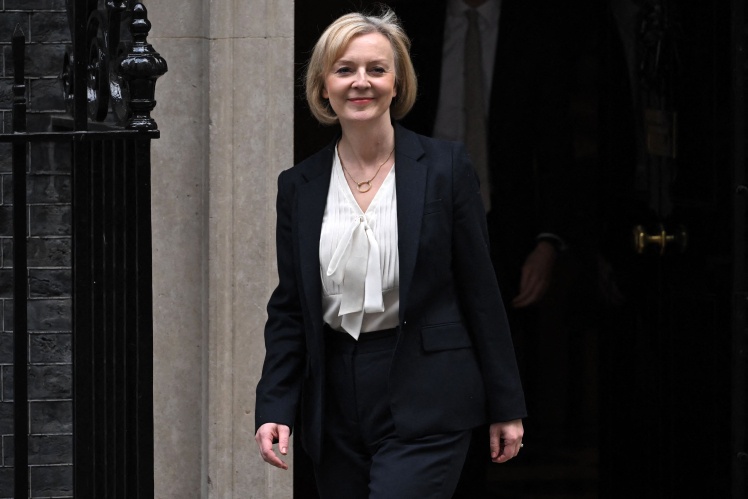Who is Liz Truss anyway? She had not been heard of before.
Mary Elizabeth Truss has been in British politics for a long time, held many different positions, but was not visible in the public field until 2022. She joined the Conservative Party in 1996, while still studying at Oxford. In 2001, she ran for parliament for the first time, but did not pass. The second attempt in 2006 was also unsuccessful, but in 2010 Truss finally got into parliament.
In 2012, Truss began working for the government for the first time — as Deputy Minister of Education. Then she changed several positions without staying anywhere for a long time — Minister of the Environment, Secretary of Justice, Chief Secretary of the Treasury, Secretary of International Trade, Minister of Foreign Affairs.
At the beginning of July 2022, during the government-party crisis, when Conservative ministers resigned to force Boris Johnson to resign, Truss remained neutral: she didnʼt leave the government but did not declare her support for Johnson either.
On July 10, she announced her intention to run for the position of prime minister, which was to be elected by all members of the Conservative Party. Her main opponent was former Chancellor of the Exchequer Rishi Sunak. The battle between them was ideological, although they are both conservatives: Truss promised to support business and lower taxes, and Sunak, on the contrary, to strengthen state regulation of the economy. Sunak won among conservative deputies — 38.6% against 31.8%. But the final word was the general vote in the party — Truss won 57.4% against 42.6%.
Didnʼt she fulfill her pre-election promises?
She did it, but that didnʼt make the situation any easier. On September 23, 2022, Truss and her colleague, the new Chancellor of the Exchequer, Kwasi Kwarteng, presented the "Growth Plan 2022" — a set of economic reforms that were supposed to ensure the growth of the British economy to 2.5% per year. The plan called for a reduction in the income tax from 20% to 19%, a reduction in corporate taxes, the abolition of the wealth tax and some restrictions on business. But at the same time — the freezing of communal services for two years and the increase of various social guarantees for the population.
Prime Minister of Great Britain Liz Truss. London, 19 October 2022.
Getty Images / «Babel'»
A plan that was supposed to please everyone didnʼt please anyone. Ordinary Britons are outraged by tax cuts for big business. Business — by rise of social expenditures. And all together did not understand where to get the money for all this: the budget deficit could reach £250 billion. It could only be covered by increasing the national debt. The foreign exchange market also reacted to such uncertainty — the exchange rate of the pound against the dollar fell so that they were almost equal. And the Bank of England was forced to urgently buy up British government bonds to stabilize the economy, and spend £65 billion on it.
The Truss cabinet came under a barrage of criticism. The new economic policy was criticized not only by Laborists and other opponents — on September 28, a group of Tory MPs, including one of the partyʼs leaders, Mel Stride, spoke out against the government. Even the International Monetary Fund expressed concern about Truss reforms.
Kwasi Kwarteng speaks during an extraordinary meeting on the third day of the Conservative Partyʼs annual conference in Birmingham, October 4, 2022.
Getty Images / «Babel'»
In mid-October, Truss cracked under pressure — she announced a review of the “2022 Growth Plan” and the dismissal of Kwasi Kwarteng. But this did not save either the rating of conservatives (23%), the lowest since 2019, or the popularity of Truss within the party. Against the background of falling ratings for the Tories, the rating of Labour, on the contrary, is the highest in the last eight years — 52%.
Truss said on October 17 that she recognizes the false radicalism of the reforms, but she is not going to resign. However, already in three days, she changed her mind and decided not to delay the process of electing a new prime minister. 81% of Conservative Party voters agreed with her decision.
So who will be the new prime minister?
While itʼs difficult to say, the conservatives have no unequivocal leaders who would still like to lead the government. On October 18, even before Liz Truss announced her resignation, the preferences of Conservative Party members were as follows:
- Former Prime Minister Boris Johnson — 32%.
- Trussʼ former opponent Rishi Sunak — 23%.
- Current Secretary of Defense Ben Wallace — 10%.
- House of Commons leader Penny Mordont — 9%.
Boris Johnson?! Can he come back?
Theoretically yes. In the summer he was forced to resign by the top of the Conservative Party, Johnsonʼs popularity among rank-and-file members and voters remains quite high. This is evidenced not only by the aforementioned survey among party members: 57% of Britons who voted for the Conservatives in 2019 consider his resignation a mistake.
Boris Johnson gives a speech in Downing Street before his official resignation. London, September 6, 2022.
Getty Images / «Babel'»
The political editor of The Times, Steven Swinford, wrote that, according to his sources, Johnson will definitely fight for the prime ministerʼs seat. At the same time, the political correspondent of the BBC Ion Wells, citing her sources in the Conservative Party, wrote that the top of the party is ready to resign and sabotage the work of the government if Johnson tries to return.
And can Labor come to power now? They have great ratings.
Labor can come to power only in case of new elections. The current parliament was elected in 2019, so the next election should theoretically be in 2024. But in 2022, the 2011 Fixed Term Parliament Law was repealed. That is, for the last 11 years, the British Parliament had a clear term of office — five years. The only way to announce re-elections was by a two-thirds majority vote in the House of Commons, which happened, for example, in 2017.
But now Britain has returned to the old practice, when a new election date can be announced at any time by the monarch at the request of the prime minister. And five years is only the upper bar of the term, after which the parliament is automatically dissolved.
In the summer, Boris Johnson threatened his opponents in the Conservative Party with possible early elections in the event of his resignation. But he didnʼt do that. Any Tory prime minister willing to do that now would simply be handing power to his biggest opponents, Labour.
Does all this matter for Ukraine? Johnson and Truss supported us.
This crisis in Britain is generally domestic. There are no openly pro-Russian forces among British parties and politicians who can influence something. Boris Johnson was one of Ukraineʼs greatest allies and will be again if he becomes prime minister.
President of Ukraine Volodymyr Zelensky and Prime Minister of Great Britain Boris Johnson demonstrate a new stamp created for the Independence Day of Ukraine. Kyiv, August 24, 2022.
Getty Images / «Babel'»
Rishi Sunak once at a debate with Truss answered the question about Ukraine in the same way as she did — in favor of comprehensive support, but against the direct participation of the British army.
Ben Wallace, as Britainʼs defense minister, is actively helping Ukraine with weapons and building an aid strategy together with other NATO ministers.
Even the hypothetical coming to power of the Labor Party should not be feared. Party leader Kier Starmer wrote back in January 2022, before the Russian invasion, that he would be on Ukraineʼs side in any case. He publicly advocates providing arms to Ukraine and training our military in Britain.
Labor leader Sir Keir Starmer addresses the Yorkshire and Humber Labor Party regional conference in Barnsley on October 15, 2022.
Getty Images / «Babel'»
The problem is different. Whoever becomes prime minister in Great Britain now, the political crisis will not end so easily. The more domestic problems the British have to deal with, the less time and resources they will have to help other countries. Therefore, first of all, it will be better for Ukraine if the British economy survives the crisis and grows. Regardless of who will achieve this and with what reforms.
Translated from Ukrainian by Anton Semyzhenko.
Mutual aid and solidarity are important in difficult times. Support Babel: via Patreon 🔸 [email protected]🔸donate in cryptocurrency🔸in Ukrainian hryvnia.

